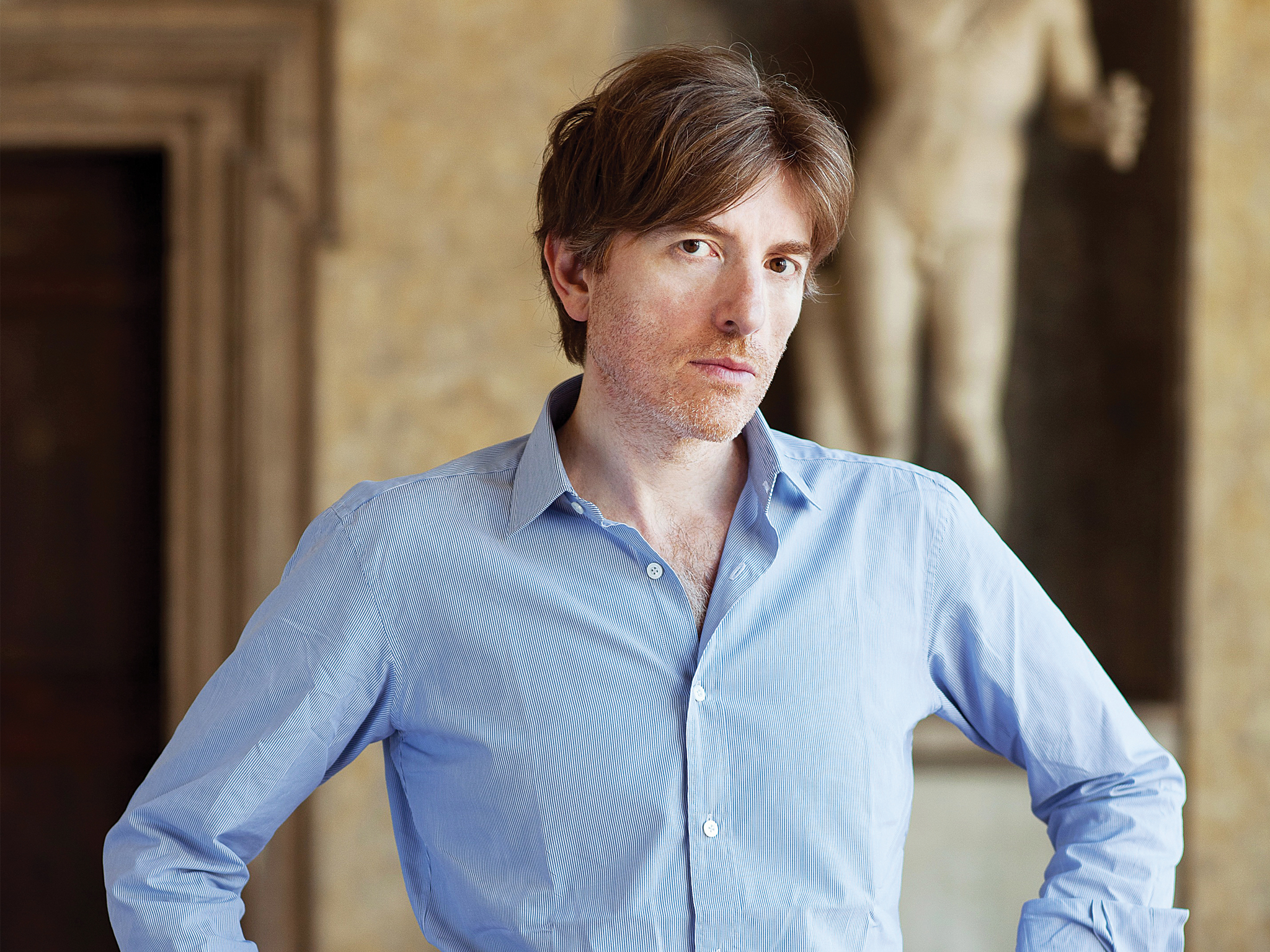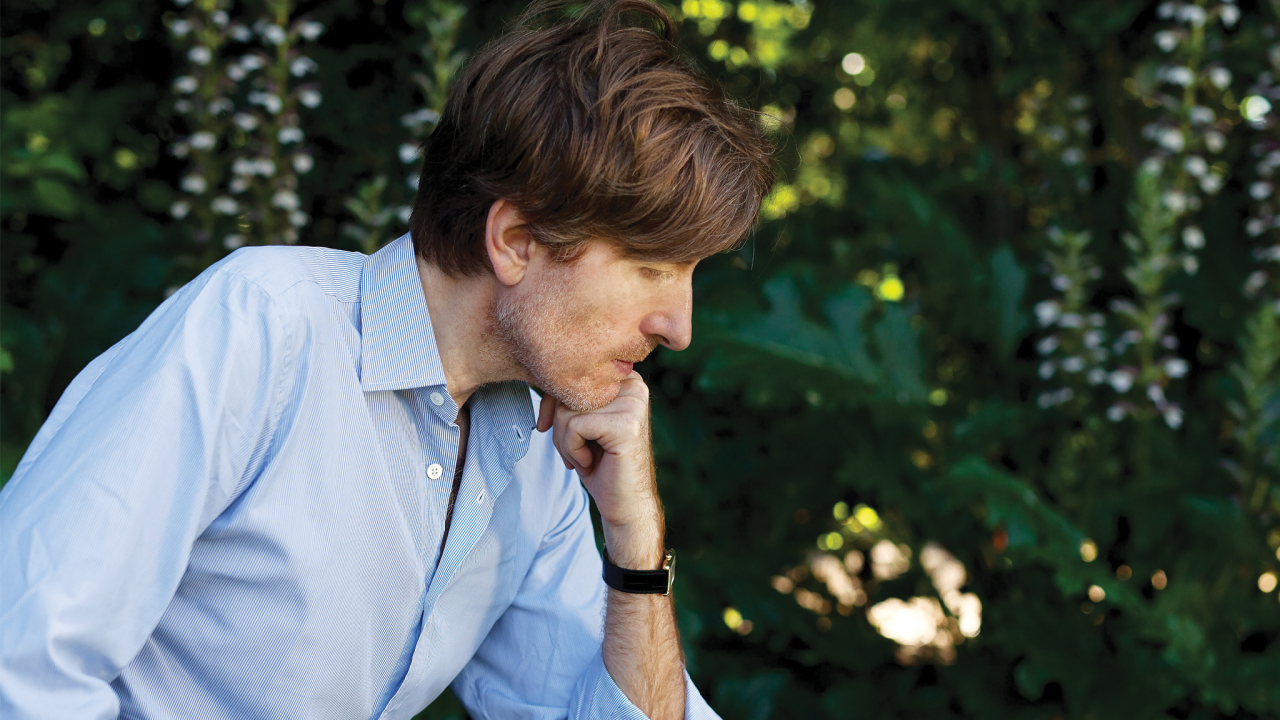Curved Air, Sky, Obscured By Clouds… Prog and all things atmospheric/stratospheric have long been virtually synonymous. Take, for another example, the duo Air, unarguably the most prog outfit to emerge from France since Magma.
Look at the evidence: the twinkling electronica of 1998’s debut album Moon Safari, its use of Moog evoking the ‘soft prog’ of ELO and Supertramp; the 2001 follow-up 10,000 Hz Legend and its allusions to Pink Floyd and Moody Blues; their 2000 soundtrack to Sofia Coppola’s movie The Virgin Suicides, with its noodling keyboard interludes and 10cc-ish studio phantasmagoria; their 2012 audio for Georges Méliès’ classic 1902 science fiction silent film Le Voyage Dans La Lune; their live wig-outs and sorties into space-rock…
And now here’s Nicolas Godin out on his own, minus his Air partner Jean-Benoît Dunckel, with an album called Contrepoint. It was inspired by Johann Sebastian Bach, cited in Chris Smith’s book 101 Albums That Changed Popular Music as one of the classical composers (along with Varèse and Stockhausen) who prog rockers have regularly drawn on in an attempt to “elevate rock music to high art status by removing its blues-based tradition and replacing it with a European symphonic foundation”. Godin has used Bach’s baroque harmonics and rhythmic inventions as the launchpad for a series of forays – each track on Contrepoint uses a different Bach piece as a jumping-off point.
I was fascinated by its time signature – 5⁄4 – as a child. I was like, ‘Fucking hell, that’s not normal, but it’s amazing – one of the best-sounding records ever.
The implication is that the 18th-century German musician has exerted a bigger influence on rock at its most avant-garde and experimental than The Beatles. There’s fugue-like opener Orca, which grows into something epic and ELP-like; the phased Police guitars of Clara; the jazzy, Dave Brubeck-y Club Nine; the churchy organ drones of Quei Due; the crazed blaxploitation homage that is Bach Off… Listening to Contrepoint, you could be forgiven for assuming that every songwriter of the last 50 years was Hooked On Bach.
“Any song that exists, you can find some melodic trace back to Bach – including The Beatles,” affirms Godin in the plush central London offices of his live booking agent.
In the run-up to the release of the album, he said of Contrepoint that it’s “as much a tribute to all the great composers that have inspired me. Making a record about Bach leads to all composers who have listened to Bach.”
Today, he goes on to explain, “On my track Widerstehe Doch Der Sünde [from Contrepoint], it has exactly the same bridge as Hey Jude, and that comes from Bach.”
So in a way, rock’n’roll was born not in 1946 with That’s All Right Mama, but in 1722 with the seminal The Well-Tempered Clavier, Bach’s collection of solo keyboard music?
“Yeah,” Godin says, putting away his latest toy: a brand new Burns bass that he’s just bought on musician’s paradise Denmark Street. (It’s the same instrument used by Serge Gainsbourg, although his favourite bassist remains John Entwistle.) “Even the blues,” he adds, “comes from Bach.”
When Prog asks why Bach and not Mozart, Beethoven or Chopin, the answer is very convoluted, involving tones and half semitones, lots of hifalutin musicological detail that’s way beyond your humble scribe. Better perhaps to consult Wikipedia, which praises Bach’s “technical command, artistic beauty, and intellectual depth”. Basically, contends Professor Godin, Bach wrote the rulebook of Western music. “He showed us all the technical possibilities that you can do as a composer,” he summarises. “His achievement is amazing.”
And how does Godin believe Bach would have responded to his Contrepont – suitably reverent extrapolations on his pioneering themes, or sheer sacrilege?
“Oh,” he replies, “I did a kind of sacrilege. Because when you look at the sheet of paper with one of his scores on, it’s completely perfect; there’s really nothing to add, it shouts loud, it’s amazing. But because it’s so perfect, it gives you the freedom to freak out with it and do whatever you want. You don’t have to do it ‘right’ because the right way is already written.”
The beauty of Bach, apart from the music itself, was that it provided Godin with fresh inspiration after becoming disillusioned during Air’s 2010 world tour.

“Music was taking up only a small part of my daily life,” he said recently. “I’d become a travelling monkey in the concert circus.
“We [Air] weren’t surprising ourselves any more, like other bands after 10 years or more,” he continued. “The big challenge for an artist is to have a reason to be, because there are already plenty of records out there. I’d made a statement with Air and I wanted to go back to the classical world, to grow up musically, to renew myself.”
Bach gave Godin that reason to be. Also inspirational were the 70s performances of Bach’s music by pianist Glenn Gould, which Godin hails as “more punk than punk”. It was an equally audacious punk gesture on Godin’s part to create these songs, inspired by Bach, and then put his name alongside the composer on the sleeve: “Godin-Bach”, they read, just like Lennon-McCartney, or Anderson-Howe. That must be quite a buzz?
“I think it’s badass!” Godin says, cracking up. “That’s so fucking funny. I did the record just for that!”
Godin isn’t the first musician in the rock realm to pay tribute to Bach, of course – Wendy (née Walter) Carlos got there first, in 1968, with Switched-On Bach, an album of Bach’s music performed on synthesizers (which, incidentally, was the album that inspired Keith Emerson to invest in his first Moog). Godin describes Orca as an homage of sorts to Carlos, but Contrepoint is by no means Switched-On Bach Volume 2.
“No,” he says, comparing his own departures from Bach’s point zero to Carlos’ more faithful, albeit electronic, facsimiles. “I have total respect for Wendy Carlos and think Switched-On Bach is amazing and really enjoy listening to it, but I like to surf on that line between cheesy stuff and emotional stuff and I think sometimes I don’t want to resist the emotional part. Technically, Wendy Carlos is just a score played on a Moog, and I wanted to do something more than this, something more personal.”
It was the very personal nature of Contrepoint that meant he needed to do the record alone, minus his Air partner. While we’re on the subject of relationships, Godin talks in the press release that accompanies the album about “the relationship between interdependent harmonies… the rhythm and contour”. What did he mean?
“I don’t know,” comes his honest reply, with a grin. “I must have drunk too much red wine when I said that.”
More straightforward are his assessments of the album’s individual tracks. Bach Off was written in the style of his favourite soundtrack composers, including Francis Lai, Lalo Schifrin and Jerry Goldsmith. Club Nine references Dave Brubeck’s jazz standard Take Five.
“I was fascinated by its time signature – 5⁄4 – as a child,” he recalls. “I was like, ‘Fucking hell, that’s not normal, but it’s amazing – one of the best-sounding records ever.’”
Clara opens with an Echoplex tape delay straight out of The Police’s Walking On The Moon. “I fucking love The Police,” Godin says, his Gallic accent working a treat with those Anglo-Saxonisms. “Stewart Copeland and Andy Summers… they were pop songs but completely freestyle with the drums and guitar. Can you imagine this music was playing on the radio? That was a good time.”
Technically, Wendy Carlos is just a score played on a Moog, and I wanted to do something more than this, something more personal.
The track was a deliberate act of worship. “Yes, yes,” he says, tongue somewhat in cheek. “Everything [on the album] was a tribute and I don’t have any original ideas, ever.”
Godin tends towards self-deprecation, which seems strange from a man whose success allows him to travel the world, “drink very expensive wines and take very expensive planes” (although he prefers Business – the ostentation of First Class he finds “vulgar”), and stay in fancy hotels where, yes, he often hears Air’s music wafting over the PA, much to his disgust.
“I’m the king of the fucking hotel lounge,” he says with a wince, pausing for comic effect. “At least I achieved something in my life.”
‘King’ isn’t quite right, actually; try ‘Knight’. Yup, this self-debunking Gaul was, in 2005, awarded the Chevalier dans l’Ordre des Arts et des Lettres – the French equivalent of a knighthood.
“We [he and Dunckel] got it from the Minister of Culture because they said we helped spread French culture all over the world,” he explains, pointing out the three rules of being knighted in France: “You don’t ask for it, you don’t refuse it and you don’t wear it,” he says of the medal and green ribbon that each knight gets given. “No, it’s about having class: only you know. You don’t need to show it – that would be vulgar.”
Do they employ a formal, royal term of address for him back home?
“No,” he replies, drily, “because unfortunately we cut off the head of the king 200 years ago and they’re against things like that, which I really regret. So we are the Knights of the Old Republic – just standard Jedi stuff.”
Interview done, I point at the copy of Prog lying on the table that I brought with me and ask whether Godin feels strange being inducted into our world.
“Not at all,” he says, eyeing the month’s cover star. “I’m a big fan of Frank Zappa.” Then he pauses again, this time to consider their relative contributions. “But Zappa was a great musician. A super-great musician compared to me. I’m good at making instrumental music that’s not boring – that’s my style.”
What an epitaph.
“Yes,” he says. “I’d like that on my grave.”
Contrepoint is out now on Because Music. See www.nicolasgodin.com for more information.

